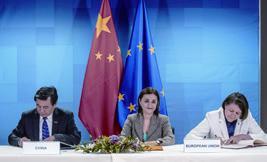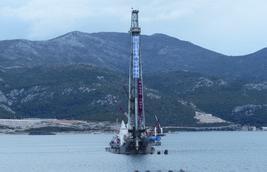Partnership for Global Challenges
2020-05-11ByNicolasChapuis
By Nicolas Chapuis



It was 45 years ago, on May 6, 1975, in Beijing when Christopher Soames, Vice President of the European Economic Community (EEC) Commission in charge of external relations, and Qiao Guanhua, Minister of Foreign Affairs of China, formalized the establishment of diplomatic relations between the two sides. The day before, despite his hospitalization, Premier Zhou Enlai insisted on receiving Soames.
Chinas recognition of European integration echoed its strategic intention to counter the desire for hegemony of the superpowers by relying as much on the desire for autonomy and unity of the Europeans, as on the quality of the relationship between the EEC and developing countries. The LoméConvention, a trade and aid agreement between the EEC and 71 African, Caribbean, and Pacifi c countries, was signed in February 1975. On the European side, besides Soamespersonal interest in China, it was about taking advantage of the Peoples Republic of Chinas regaining of its lawful seat in the UN in 1971 and the process of normalization of China-U.S. relations from 1972 to 1979 to establish offi -cial relations with China—just as the EEC had done with India as early as 1962.
May 1975 would also open a new chapter in the shared history of Europe and China through Vice Premier Deng Xiaopings visit to France on May 12-17. This historic move, the fi rst visit by a Chinese state leader to the West, heralded the development of comprehensive relations between Europe and China.
Forty-five years later, the relationship between the EU and China has become a pillar of the international system.
Global strategic partnership
The first trade agreement linking the EEC to China was signed in 1978, and the first visit to China by a president of the EEC Commission, Roy Jenkins, took place the following year. Europe-China cooperation in the early days emphasized technical assistance and development aid, particularly in the agricultural, educational and scientifi c fi elds.
The diplomatic mission of the European Community Commission was established in Beijing in 1988, under the leadership of Frances Pierre Duchateau (1921-2009).
The 1990s was marked by the growing importance of political dialogue due to the fall of the Berlin Wall in 1989, the creation of the EU in 1992 and the process of EU enlargement from 1994. The European Commission published its fi rst communication on China in 1995, referring to a longterm policy, paving the way for a dialogue on human rights and the organization of the First EU-China Summit in London in April 1998. This political process supported the negotiations for Chinas entry into the World Trade Organization (WTO) in 2001.
